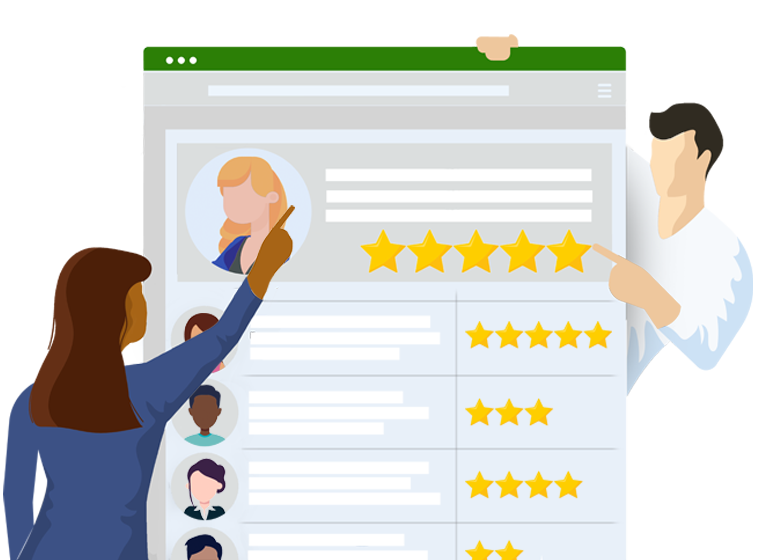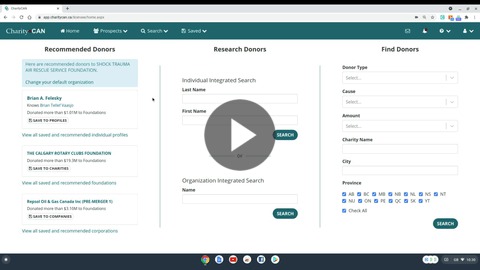Key Features and Data 2024
Features
Donor Discovery
Donor discovery is a new way to identify prospective donors that builds on a classic donation record search by adding relationship filters. Use donor discovery to quickly identify a list of prospects who have a history of supporting your cause and have relationship map connections to your organization.
Integrated Search
An integrated search looks for information in all of CharityCAN’s datasets for an individual, foundation or corporation. This search is perfect for researching a prospect or finding out more information about a current donor.
Relationship Mapping
Relationship Maps show you who your prospect is connected to. CharityCAN maps relationships based on:
- Shared time on charity boards
- Shared time on corporate boards
- Shared time on the board of federally registered corporations
- Shared ownership of a federally registered plane or boat
- Shared surname and postal code
You can use relationship mapping to:
- See how your prospect is connected to your organization
- Search board members’ networks for major gift prospects
- Better understand your prospect’s network and connections
- See how your donors are connected to your prospects
- Create your own relationship maps
Relationship Paths
Relationship paths allows you to quickly identify connections among people, charities, and companies. This search is perfect for seeing who your board members, major donors, corporate donors, or any other friend of your organization is connected to.
Household Data Search
Using CharityCAN to find out household data information is simple. Navigate to Household Data and enter a 3 or 6 digit postal code and CharityCAN will return the following information:
- Average household net worth
- Average dwelling value
- Average dwelling value minus mortgage
- Average household annual income
- Average household discretionary income
- Average household annual donations to religious and non-religious organizations
This data set can also be used to populate a list of individuals CharityCAN has been able to associate with a postal code and view connections to any individuals who live in the postal code.
Foundation Search
Foundations are an important source of funding for fundraising organizations and CharityCAN makes it easy to search for potential foundation donors. You can search by name, keywords, charity number, cause/category, charity type, location and revenue level. You can also search by donee category and program.
Data
Donation Records
Donation records are aggregated from Canadian NOZAsearch records, which have been gathered from publicly available websites across the internet, and the gifts to qualified donees section of the T3010 charity tax filings from the Canada Revenue Agency. All donation records are updated monthly.
Canadian Who’s Who
Canadian Who’s Who is the standard reference source of contemporary Canadian biography, listing prominent Canadians on merit alone. Biographies are updated on an ongoing basis and each biography lists the date it was last edited.
Political Donors
Political contributions are from Elections Canada’s open data sets and are updated monthly.
Refinitiv & Corporate Canada
Both our Refinitiv salary records and Corporate Canada records are sourced from Refinitiv and include compensation and biographical information on the board of directors and top named executive officers from public and large private companies across Canada. Records come from public disclosure documents from Canadian companies required by the Canadian Securities Administrators and are updated daily.
ZoomInfo
ZoomInfo search results come directly from ZoomInfo’s contact database. ZoomInfo uses their diverse portfolio of proprietary technology, community of 300,000+ users, and third-party integrations to collect, organize, validate, and publish the most comprehensive directory of business data in the marketplace.
Public Sector Salaries
Public sector salaries are released by their respective provincial governments and imported once a year. Records are updated when governments disclose salaries.
Charity Directors
Data on the directors of charitable organizations are sourced from the T3010 tax filing required by each registered charity in Canada. Records are updated on a monthly basis.
Prospect Profiles
Prospect profiles are programmatically created profiles that attempt to identify unique individuals within the various CharityCAN datasets and bring that information together into one profile.
Profiles are updated monthly.
Household Data
Household data values are estimates based on past Census data, the Survey of Household Spending, the Survey of Financial Security, the monthly Labour Force Survey and the monthly Consumer Price Index from Statistics Canada; Royal LePage’s quarterly Survey of Canadian Housing Price; and monthly housing statistics from the Canadian Mortgage and Housing Corporation.
This dataset is updated annually.
FullContact Social Data
FullContact social data is available on our corporate and saved prospect profiles and can provide an overview of an organization or individual’s social media accounts, a social media biography, and a summary of social media interests.
Aircraft Registry
Search Canadian aircraft owners with our Aircraft Registry Search. You can search for owner name, type of aircraft or geographic area to find some plane owning prospects near you.
Marine Craft Registry
Search marine pleasure craft from Transport Canada’s Register of Vessels. Boats on this registry are mostly vessels of 7 metres or longer whose owners want to register their vessel name or need a marine mortgage. If your prospect’s name is on the list as an owner, we’ll show you the vessel’s name, size and date of registration in our Integrated Search results.
Federal Corporations
Data from Corporations Canada on all federally registered corporations and their directors. This data includes information on not only privately held corporations but also not-for-profits, co-operatives and boards of trade from all across the country.
Obituaries
Obituary data from Canada Deceased List’s ObitScan and Canada Bereavement Registry products. With their help we’ll be providing thousands of recent Canadian obituaries from public online sources every month.



